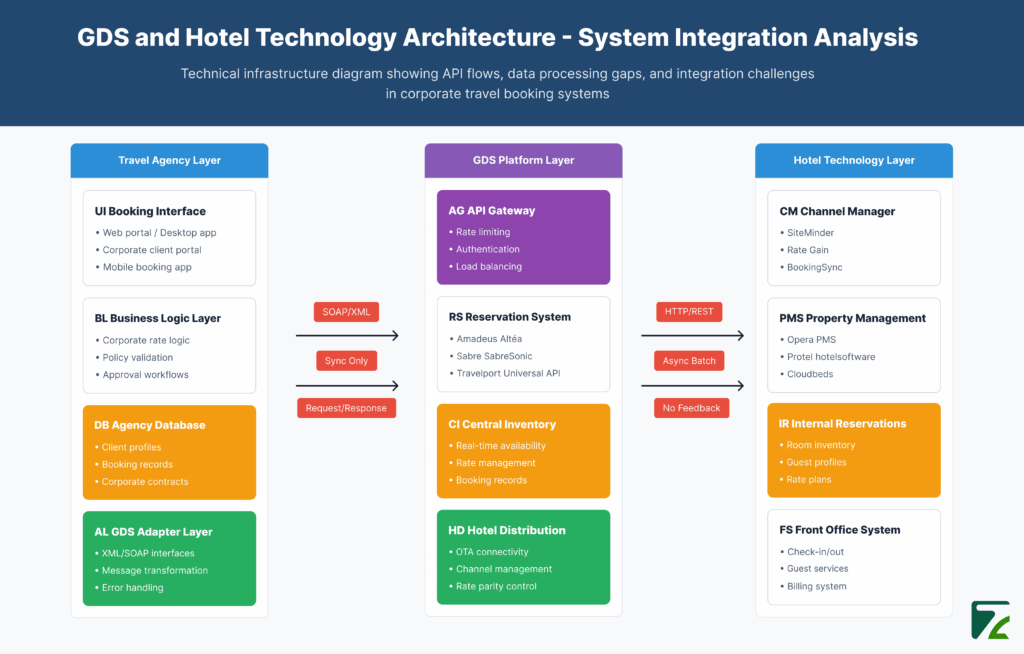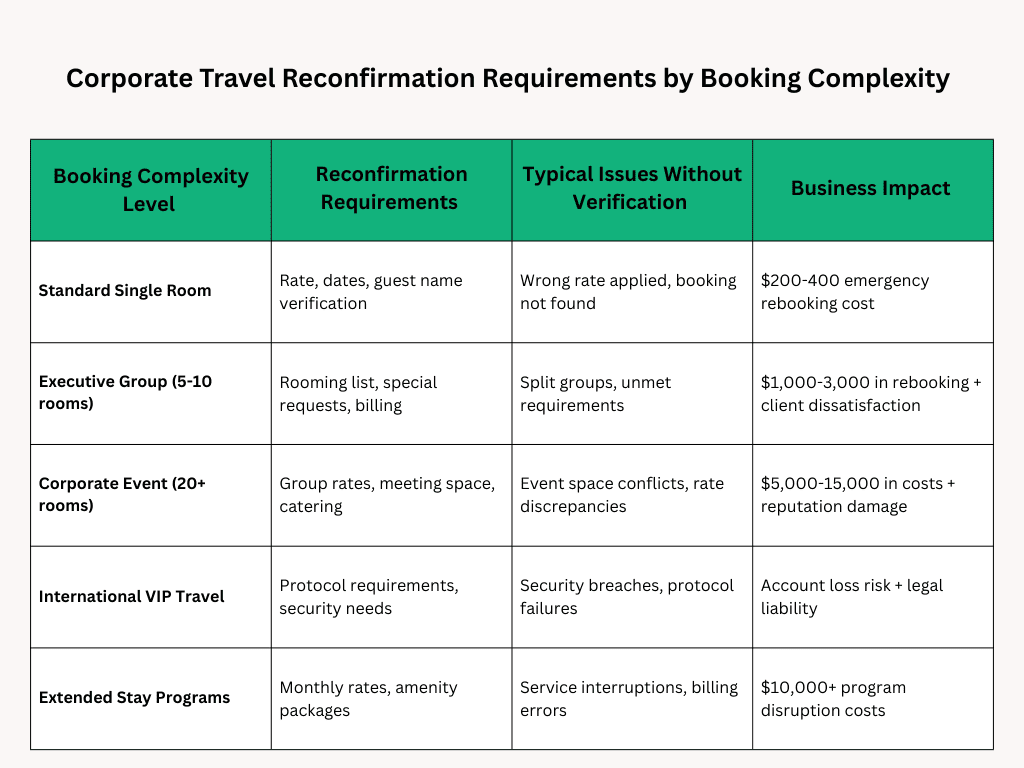Your agency has just completed 200 corporate bookings for a multinational client for their quarterly review meetings. It all appears as it should, your booking system confirmations arrived, rates locked, special requests documented. Yet at 3 in the morning, your phone rings. Because despite having confirmed reservations, 20 other executives are “stuck” at the Milan Marriott due to the fact that “our reservations don’t exist” in the hotel’s system.
It’s the nightmare scenario that is every corporate travel agency’s shame to admit but it does happen. Even as these agencies process thousands of bookings each month using GDS systems, the gap between a booking confirmation and a hotel can be opened as huge liability that can ruin the client relationship in one stroke.
Corporate travel agencies function in a diverse landscape where booking confirmation is only the tip of the iceberg in a multilayered stage. Your agency gets notified via Amadeus, Sabre, or Travelport, but these reservations are processed into hotels’ completely different PMS technology stacks. This mismatch presents the essential problem that reconfirmation is intended to solve.
It is an evident problem from the operational workflow. When you are booking through a GDS system you request a reservation that the hotel has to process internally. A hotel receives hundreds of bookings daily from different sources like direct bookings, OTA channels and GDS channels. In this process, important facts can fall through the cracks, rates can be altered, and reservations can go flat-out missing in hotel systems.
Your current reconfirmation process utilizes staff members to place confirmation calls during the course of normal business. For the average agency with 1,000 bookings per month, this is about 250 staff hours, the equivalent of nearly two full-time positions exclusively spent on calling to reconfirm reservations. In high season, this amount of work can be too much for resource capacities, leading to a choice between delayed processing and adequate review.
The numbers get trickier with international bookings. Coordination of time zones means that your 9 a.m. call to validate a hotel booking in Singapore happens at 10 p.m. at the site, requiring scheduling call backs and follow up when needed. These difficulties are compounded by language barriers, with important booking information potentially miscommunicated verbally over the phone.

Agencies generally function on “integrated” technology stacks linking GDS systems to back-end processes, while hotels are operated independently with their own property management systems. That leaves an information void that regular booking confirmations can’t fill. Your confirmations with Amadeus or Sabre reflect the successful publishing of your booking but bear no relationship to how hotels process these bookings internally.
Corporate bookings may have intricate needs that standard GDS confirmations may not validate. Whether your client needs connecting rooms for a board meeting, early check-in at 6 a.m. for an international flight arrival, or specific room floors for security or personal reasons, the initial booking confirmation doesn’t ensure hotels will accommodate those needs. You’ll get this information from communicating directly with the hotel staff to ensure that these corporate needs are properly recorded and will be ready for you when you arrive.
Automated hotel reconfirmation systems illustrate how technology has the potential to overcome the limitations of manual processes. The top platforms have processed over 1,000 bookings with no missed confirmations and provided participating agencies with a 35% reduction in operational costs. That level of performance is not just an efficiency gain its operational reliability that you absolutely don’t get with the manual processes.
The method is also radically different from prior attempts on automation. Instead of replacing human interaction altogether, this type of conversational machine give rise to human-like communications that hotel employees are happy to attend to. This AI platforms automate communication and travel operations while delivering the personal engagement that hotels want with powerful AI agents for autonomous communication across multiple channels.
It integrates into your existing technology stack, rather than requiring the replacement of the entire system. Advanced automation solutions come with plug-and-play microservices to connect not only to internal systems but to such services as GDS platforms, online travel agencies (OTAs), payment gateways, back-office and CRM (customer relationship management) systems, and GDSs. This solution keeps your existing booking workflows and adds automated verification.
For those agencies that work on Amadeus systems, the implementation is seamless with your current booking pipeline, and you can use the integration without any upheaval in your workflow setup. Sabre customers also enjoy similar integration abilities and Travelport connections offer full GDS coverage. The system receives the new reservations from these systems in an automated manner and performs the relevant “reconfirmation actions” in accordance with configurable rules and priorities.

Corporate group bookings are the most difficult part of manual reconfirmation processing. You book more than 50 rooms for a company conference and have to manually schedule individual needs while keeping the group together. Every passenger will likely have their own needs, food allergies, disabilities or room requests that need to be confirmed with hotel staff via phone.
This coordination challenge becomes a painless process when you rely on automated systems. Sophisticated systems will systematically work through the rooming list checking off each person’s requirement protecting the integrity of the booking as a whole. The reservation system is able to verify availability of connecting rooms for the executive committee, confirm that the conference room booking is correctly associated with the group booking, and that the special catering needs are recorded and available.
International corporate booking is complex and something that manual processes are not good at dealing with. Your call at 2pm to a Tokyo hotel won’t come back until 3am local time and even then, the callback scheduling and lost connection loops take up the next several attempts. These delays can add 48-72 hours to confirmation lead times, which is a major concern for urgent corporate travel.
For automated reconfirmation, this time zone coordination is not an issue. The system is live 24 hours a day in every time zone, and makes calls at each hotel’s (or chain’s) local business hours. Multi-lingual capacities allow local hotel staff communication and cultural adaptation accommodates communication style diversity between regions and hotel chain.
The booking of corporate tends to come with complicated payment policies, and this could cause troubles at check-in. If your agency applies virtual credit cards, prepaid-filed flowers or corporate accounts to bookings, then all of these as often the payment methods may not be processed correctly by the hotels in their technology. And with payment status issues, check-in hassles may irritate executive travelers.
The automated reconfirmation systems confirm basic payment status during the confirmation. The system validates that payments are exhibited as prepaid, Virtual Credit Card authorization or card on file in the hotel system. If the payment status is pending or unprocessed, the system prioritizes these bookings for manual intervention prior to traveler arrival. This validation helps to prevent the most common delays associated with check-ins due to payments; however, more complex rate negotiations still require manual review when the prices don’t match
Most concerns about introducing an automated reconfirmation facility are related to staff dislocation and workflow interference. Successful rollouts, however, have proven that automation is meant to complement not replace human expertise in corporate travel operations. Employees shift from manual confirmation calling to more valuable areas such as complex troubleshooting, proactive customer support, and strategic account growth.
The success of automated reconfirmation depends on well-managed changes to staff roles. Typical implementation is 2-8 weeks based on complexity and integration with existing systems. Members of staff are taught to control automatic workflows, as opposed to lifting confirmation tasks, in order to supervise and carry our manual workload.
All vendors offer basic training as part of implementation, but agencies should expect to provide additional change management training internally. This will involve creating new process flow, reviewing job descriptions to reflect new duties and ensuring staff appreciate their new role in the automated process.
Automated reconfirmation should be introduced with a clear message to existing corporate customers about process improvement and greater reliability. Especially, the clients realize that finally the booking they have will be thoroughly checked with quick turn-around time. The secret is to cast automation as an improvement of service, and not just a cost reducing technology.
Based on the above considerations, the communication should focus on enhanced reliability and kept risk (and not on the technical capabilities). Corporate customers only care about outcomes that are smooth check-ins, correct billing, and special requests that are met and don’t care how the technology used to achieve these is making the sausage. Offering a view in the improved verification increases the trust even with people without technical skills.
Performance metrics that clearly show value for both internal stakeholders and clients need to be established on successful automation implementations. The primary measures are improvements of the operational efficiency and error occurrence, as well as enhancement of customer satisfaction instead of pure cost-related factors.
Automated reconfirmation systems handle the sensitive data of corporate travelers, so, there is a need to consider security and compliance requirements from the outset during implementation planning. GDPR compliance obligations apply to any agency working for European corporate clients, and you’ll be subject to other data protection laws depending on where your clients are based and where they book.
Today’s automatic reconfirmation systems are equipped with an array of security measures that are in line with enterprise compliance standards. All data transfers are End-to-End encrypted, and role-based access controls ensure appropriate visibility of data. Frequent security audits and being SOC 2 Type II compliant give peace of mind to enterprise clients under the strictest data protection mandates.
By automating reconfirmation, you become more than a passive agent to corporate clients, but a proactive risk partner. In a world where clients enjoy a seamless check-in experience across every destination, trust in your agency spikes. This trust turns into a competitive advantage, which allows the charging of premium pricing and introduction of additional, high margin services.
This change is much bigger than just individual booking success; it’s a radical shift in how to manage a travel program. Corporates will start seeing your agency as part of their essential infrastructure required to operate, rather than a supplier relationship that can be substituted. Such placement enables wider collaboration and more feature offerings.
Automating re-confirmation eliminates the biggest inhibitor to agency growth, human resources needed for manually checking. Booking volumes driving manpower: As booking volumes climb, traditional agencies have to add people to keep up with growth such that cost pressures become a significant drag on growth. Automation allows you to process many more bookings without hiring many more staff.
The scalability benefit is particularly useful in situations with seasonal peaks and high customer growth. There is no need to recruit temporary staff in high season, the systems deal with increased work load automatically and consistently. The opportunity for growth is untapped, and clients have done extremely well over the last decade.” Operating flexibility has enabled that growth
The corporate travel management space is a competitive one with clients demanding high levels of service amidst ongoing cost pressure. Organizations which are able to prove themselves to be more reliable by utilizing automated verification give a massive competitive edge, typically perceived during client meetings and contract discussions.
Being able to ensure that bookings are correct is a tremendous sales tool it sets your agency apart from the competition who is still doing things manually. More and more, booking reliability is being acknowledged by corporate procurement teams as a very important risk management factor that justifies paying premium fares for best-in-class suppliers.
When you see what continues to work, proven from seamless integrations such as Zeal Connect Platform, you realize that hotel reconfirmation automation is the backbone technology needed for today’s corporate agencies. The technology addresses the basic workflow needs that manual processes can’t address at scale, but brings the kind of reliability corporate clients have come to expect.
The change is not only operational but is also strategic in positioning a business. When your agency can promise booking accuracy, remove the check-in surprise and take comprehensive vetting of complex corporate needs off the table, it makes the shift from service supplier to trusted advisor. This set up leads to consistent competitive edges that can lead to long term business growth.
For corporate travel agencies that need to keep pace with growing booking volumes and wish to retain service quality, automated reconfirmation serves as the foundation of scalability and reliability on which all else hinges. Agencies that are successful in 2025 will be the ones that accept auto-hotel reconfirmation as part of the infrastructure that exists, not some sort of technology add-on.
Automated hotel reconfirmation uses AI to verify reservations directly with hotels, ensuring accuracy, reducing check-in issues, and improving client trust.
Because GDS confirmations don’t sync directly with hotel property systems, bookings can be lost, modified, or miss special requests.
It replaces hours of manual calls with AI-driven verification, cutting costs by up to 35% while freeing staff for higher-value tasks.
Yes. Leading platforms use encryption, role-based access, SOC 2 certification, and GDPR compliance to protect sensitive traveler data.
Automation covers most standard and group bookings, but complex rate disputes or unusual requests may still need manual review.

Travel Automation Expert